Sustainable retail bag enables post-wildfire reforestation
Projects Sponsor
When regulations required fees for reusable bags, TELUS launched a nationwide transition to Tree Totes, made from 100% post-consumer recycled cotton. For every Tree Tote purchased, one tree is planted in Canadian post-wildfire restoration areas. In its first year, the program achieved a 98.4% reduction in bag consumption, eliminated 17,475 kg of plastic waste (equivalent to 1,940 car tires), and planted 2,364 trees, building on TELUS’ environmental legacy of 20+ million trees planted since 1998. While they hope to inspire other organizations to apply this business model, right now it’s tote-ally TELUS that has sustainability in the bag.
When regulations required fees for reusable bags, TELUS transformed compliance into environmental action. Instead of charging fees only where mandated, TELUS launched a comprehensive, nationwide transition to Tree Totes made from 100% post-consumer recycled cotton. Every Tree Tote purchased plants one tree in Canadian post-wildfire restoration areas, reforesting where it’s needed most.
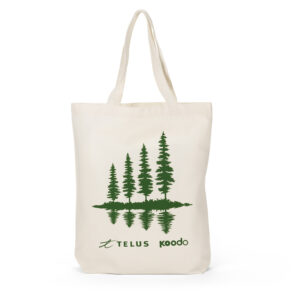 The Tree Totes project emerged from multiple challenges. New municipal bylaws and provincial regulations required charging fees for reusable bags, creating a customer-confusing patchwork system. TELUS was obligated to charge customers in certain locations but not others. Extensive jurisdictional mapping across Canada, revealing that 32% of TELUS stores were required to comply with municipal and provincial bag fee regulations. This analysis exposed a complex patchwork of requirements with varying fee structures, creating operational inconsistencies and compliance challenges across their network.
The Tree Totes project emerged from multiple challenges. New municipal bylaws and provincial regulations required charging fees for reusable bags, creating a customer-confusing patchwork system. TELUS was obligated to charge customers in certain locations but not others. Extensive jurisdictional mapping across Canada, revealing that 32% of TELUS stores were required to comply with municipal and provincial bag fee regulations. This analysis exposed a complex patchwork of requirements with varying fee structures, creating operational inconsistencies and compliance challenges across their network.
At the same time, Canadian wildfires are devastating landscapes, with tens of millions of hectares burned over the past few years, creating urgent reforestation needs. TELUS recognized that some customers may be frustrated with new charges, might assume government-mandated fees support public programs, and be perplexed as to where the money goes. To help clear the air, literally, TELUS chose to not just switch out the bags, but reinvest all proceeds from their new sustainable totes directly into nature restoration. Their goal was to positively impact the environment while enabling their customers to support a program that aligns with their corporate values. Moving that program from research to rollout took significant elbow grease.
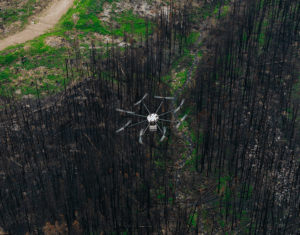 Preliminary consumer research helped TELUS understand consumer preferences and purchase behaviors. followed. A survey of 1,166 TELUS and 515 Koodo customers, conducted in August 2024 indicated a strong preference for natural fiber materials (cotton/canvas) over plastic alternatives. As well, 43% of TELUS customers expressed interest in tree imagery in the design and 61-68% felt positive about purchases that support tree planting. Environmental concerns (58%) and cost savings (51-47%) were the primary motivators for reusable bag usage.
Preliminary consumer research helped TELUS understand consumer preferences and purchase behaviors. followed. A survey of 1,166 TELUS and 515 Koodo customers, conducted in August 2024 indicated a strong preference for natural fiber materials (cotton/canvas) over plastic alternatives. As well, 43% of TELUS customers expressed interest in tree imagery in the design and 61-68% felt positive about purchases that support tree planting. Environmental concerns (58%) and cost savings (51-47%) were the primary motivators for reusable bag usage.
Engagement with retail partners gave TELUS insights into existing bag management responsibilities, operational constraints, helping then ensure secure critical bag buy-in. This phase established the operational foundation and stakeholder alignment necessary for success.
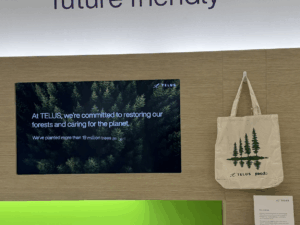 TELUS looked to go beyond mere compliance but understood that couldn’t be responsibly done by just binning the bags on hand. They wanted to minimize waste and enable strategic transition by responsibly utilizing existing plastic bag inventory. The plan was to gradually prepare customers for a premium sustainable product, instead of immediately discarding functional inventory.
TELUS looked to go beyond mere compliance but understood that couldn’t be responsibly done by just binning the bags on hand. They wanted to minimize waste and enable strategic transition by responsibly utilizing existing plastic bag inventory. The plan was to gradually prepare customers for a premium sustainable product, instead of immediately discarding functional inventory.
In June 2024, TELUS began charging for their existing plastic bag inventory, using jurisdictional minimums, or $1 where no minimums existed. This helped establish customer charging behavior while responsibly depleting existing stock. This phase of the transition achieved an immediate consumption reduction, initiated funding for tree planting efforts, and prepared customers for the premium sustainable product to follow—and premium it very much is!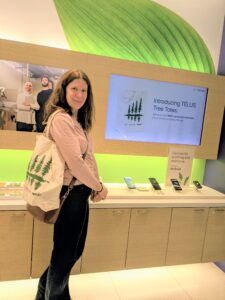
Most supposedly reusable bags on the market just aren’t particularly reusable. They’re semi-disposable plastic products that are neither truly durable nor washable, contributing to waste and microplastic pollution. TELUS planned to provide commensurate value to its customers by developing truly sustainable bags from 100% post-consumer recycled cotton—washable, durable, and designed for years of use. This was not as easy as going shopping.
The TELUS Tree Tote team conducted a comprehensive scan for 100% post-consumer recycled cotton bags but found that no existing products met their price point and environmental specifications. This gap necessitated custom manufacturing, a contract that went to Genumark. While this took additional time, involving as it did circular procurement training through Partners in Project Green, and meant higher upfront investment, it enabled TELUS to achieve superior sustainability standards including a SMETA/SEDEX-certified factory, water-based inks, and a truly durable design.
Printing on natural material challenged TELUS’s conventional brand standards. The TELUS Tree Tote team worked closely with marketing to find a viable solution that balanced sustainability goals with brand integrity. Once they’d secured leadership alignment across multiple business units, they also surveyed frontline retail staff who interact with customers daily and incorporated their feedback into final design decisions, giving the customers what they want.
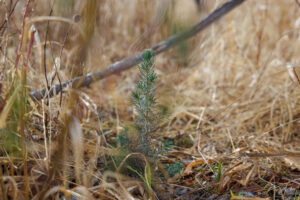 In April 2025, TELUS Tree Tote team coordinated implementation logistics for the Tree Totes launch, developed training materials, and successfully transitioned from plastic bags to the $3 Tree Totes program nationwide, establishing the 1:1 tree planting model while ensuring all operational and compliance requirements were met.
In April 2025, TELUS Tree Tote team coordinated implementation logistics for the Tree Totes launch, developed training materials, and successfully transitioned from plastic bags to the $3 Tree Totes program nationwide, establishing the 1:1 tree planting model while ensuring all operational and compliance requirements were met.
The $3 pricing strategy reflects the selection of 100% recycled cotton material, the inclusion of tree-focused design elements, and the decision to exceed regulatory requirements with a premium sustainable product. It’s also about more than offering customers a better bag.
By directing the tote proceeds to tree planting in post-wildfire areas—ensuring customer fees support meaningful environmental action—improves the customers’ experience by clearly linking fees to tangible environmental outcomes.
In its first year, the program achieved 98.4% reduction in bag consumption, eliminated 17,475 kg of plastic waste (equivalent to 1,940 car tires), 361,875 plastic pieces, and planted 2,364 trees, building on TELUS’ environmental legacy of 20+ million trees planted since 1998.
While they hope to inspire other organizations to apply this business model where proceeds fund nature restoration, right now it’s tote-ally TELUS that has sustainability in the bag.













